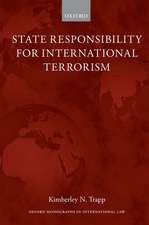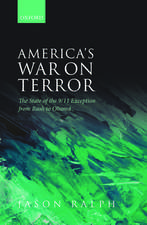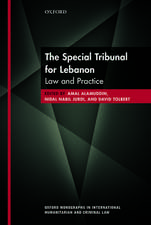Targeted Killings: Law and Morality in an Asymmetrical World: Ethics, National Security, and the Rule of Law
Editat de Claire Finkelstein, Jens David Ohlin, Andrew Altmanen Limba Engleză Paperback – mar 2012
Toate formatele și edițiile
| Toate formatele și edițiile | Preț | Express |
|---|---|---|
| Paperback (1) | 487.25 lei 31-38 zile | |
| Oxford University Press – mar 2012 | 487.25 lei 31-38 zile | |
| Hardback (1) | 754.36 lei 31-38 zile | |
| OUP OXFORD – 29 feb 2012 | 754.36 lei 31-38 zile |
Preț: 487.25 lei
Preț vechi: 595.05 lei
-18% Nou
Puncte Express: 731
Preț estimativ în valută:
93.23€ • 97.34$ • 77.16£
93.23€ • 97.34$ • 77.16£
Carte tipărită la comandă
Livrare economică 24-31 martie
Preluare comenzi: 021 569.72.76
Specificații
ISBN-13: 9780199646487
ISBN-10: 0199646481
Pagini: 520
Ilustrații: illustrations
Dimensiuni: 171 x 245 x 29 mm
Greutate: 0.9 kg
Editura: Oxford University Press
Colecția OUP Oxford
Seria Ethics, National Security, and the Rule of Law
Locul publicării:Oxford, United Kingdom
ISBN-10: 0199646481
Pagini: 520
Ilustrații: illustrations
Dimensiuni: 171 x 245 x 29 mm
Greutate: 0.9 kg
Editura: Oxford University Press
Colecția OUP Oxford
Seria Ethics, National Security, and the Rule of Law
Locul publicării:Oxford, United Kingdom
Recenzii
We are entering a new era in which targeted killing will be the preferred method of fighting enemies in a great many contexts. In terms of geographical reach, targeting precision, the manageability of the intervention, and the minimization of the cost and casualties, the practice is hugely attractive to militaries and politicians alike. But it also comes with potentially grave costs in terms of respect for basic moral principles, as well as established human rights and international humanitarian law. This book provides the best possible panorama of diverse and competing perspectives on emerging practices and will be an invaluable guide to those shaping future policies in this area.
The debate over targeted killings has become the most contentious in the contemporary law and morality of war. Is it a legitimate tactic that saves lives compared with old-fashioned bombing campaigns? Or is it ruthless execution by non-uniformed spies piloting science-fiction drones from the safety of a distant control room? May states kill if capture is possible? May they kill their own citizens? What rights do the targets have? Is there a moral difference between killing anonymous enemies and killing men and women whose names you know? The law is ambiguous, and the moral issues cloudy. This volume is the most useful and thought-provoking discussion available, with a stellar group of authors who delve deep.
The debate over targeted killings has become the most contentious in the contemporary law and morality of war. Is it a legitimate tactic that saves lives compared with old-fashioned bombing campaigns? Or is it ruthless execution by non-uniformed spies piloting science-fiction drones from the safety of a distant control room? May states kill if capture is possible? May they kill their own citizens? What rights do the targets have? Is there a moral difference between killing anonymous enemies and killing men and women whose names you know? The law is ambiguous, and the moral issues cloudy. This volume is the most useful and thought-provoking discussion available, with a stellar group of authors who delve deep.
Notă biografică
Claire Finkelstein is the Algernon Biddle Professor of Law and Professor of Philosophy at the University of Pennsylvania, and a co-Director of the University of Pennsylvania Institute of Law and Philosophy. She writes in the areas of criminal law theory, moral and political philosophy, philosophy of law, international law, and rational choice theory. A particular focus of her work is bringing philosophical rational choice theory to bear on legal theory, and she is particularly interested in tracing the implications of Hobbes' political theory for substantive legal questions. Recently she has also been writing on the moral and legal aspects of government-sponsored torture as part of the U.S. national security program. In 2008 Finkelstein was a Siemens Fellow at the American Academy in Berlin, during which time she presented papers in Berlin, Leipzig, and Heidelberg. She is currently working on her book, Contractarian Legal Theory, and is the editor of Hobbes on Law (Ashgate, 2005).Jens Ohlin's research and teaching interests are focused on criminal law theory, public international law, and international criminal law. He is the author, with George Fletcher, of Defending Humanity: When Force is Justified and Why (Oxford University Press, 2008), which offers a new account of international self-defense through a comparative analysis of the rules of self-defense in criminal law. His scholarly work has appeared in top law reviews and journals, including the Columbia Law Review, Cornell Law Review, Harvard International Law Journal, American Journal of International Law, and several OUP edited volumes. His current research focuses on the normative application of criminal law concepts in international criminal law, especially with regard to genocide, torture, joint criminal enterprise and co-perpetration, as well as the philosophical foundations of collective criminal action. Andrew Altman is Professor of Philosophy at Georgia State University and Director of Research of the Jean Beer Blumenfeld Center for Ethics. Previously, he taught at George Washington University and Bowling Green State University. Professor Altman was a Liberal Arts Fellow in Law at the Harvard Law School and has published extensively in legal and political philosophy. His publications include the books, Critical Legal Studies: A Liberal Critique (Princeton U.P.), Arguing About Law: An Introduction to Legal Philosophy (Wadsworth) and A Liberal Theory of International Justice (co-authored with Christopher H. Wellman; O.U.P.) His articles have appeared in Philosophy and Public Affairs and Ethics, among other leading philosophy journals.



























